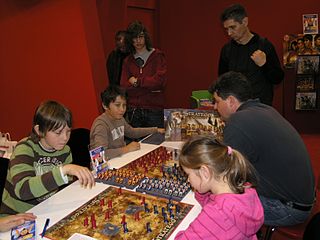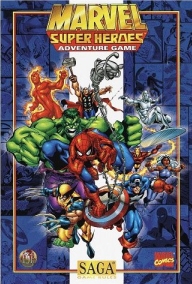
Ludo is a strategy-based board game for two to four players, in which the players race their four tokens from start to finish according to the rolls of a single die. Like other cross and circle games, Ludo originated from the Indian game Pachisi. The game and its variations are popular in many countries and under various names.

Stratego is a strategy board game for two players on a board of 10×10 squares. Each player controls 40 pieces representing individual officer and soldier ranks in an army. The pieces have Napoleonic insignia. The objective of the game is to either find and capture the opponent's Flag or to capture so many enemy pieces that the opponent cannot make any further moves. Stratego has simple enough rules for young children to play but a depth of strategy that is also appealing to adults.

Kill Doctor Lucky is a humorous board game designed by James Ernest and released in 1996 by Cheapass Games. In 1998, Kill Doctor Lucky won the Origins Award for Best Abstract Board Game of 1997.
Tigris and Euphrates is a tabletop eurogame designed by Reiner Knizia and first published in 1997 by Hans im Glück. Before its publication, it was highly anticipated by German gamers hearing rumors of a "gamer's game" designed by Knizia. Tigris and Euphrates won first prize in the 1998 Deutscher Spielepreis. A card game version was released in 2005.

Icehouse pieces, or Icehouse Pyramids, Treehouse pieces, Treehouse Pyramids and officially Looney Pyramids, are nestable and stackable pyramid-shaped gaming pieces and a game system. The game system was invented by Andrew Looney and John Cooper in 1987, originally for use in the game of Icehouse.
Martian Chess is an abstract strategy game for two or four players invented by Andrew Looney in 1999. It is played with Icehouse pyramids on a chessboard. To play with a number of players other than two or four, a non-Euclidean surface can be tiled to produce a board of the required size, allowing up to six players.

Call of Cthulhu: The Card Game is an out-of-print card game produced and marketed by Fantasy Flight Games from 2004 to 2015. It is based on Chaosium's Call of Cthulhu role-playing game, the writings of H. P. Lovecraft, and other Cthulhu Mythos fiction.
A Game of Thrones is a strategy board game created by Christian T. Petersen and published by Fantasy Flight Games in 2003. The game is based on the A Song of Ice and Fire series of high fantasy novels by George R. R. Martin. It was followed in 2004 by the expansion A Clash of Kings, and in 2006 by the expansion A Storm of Swords.
Freeloader is a game published by Cheapass Games. The object of the game is to mooch as much free stuff as possible off of your friends and neighbours.

The Marvel Super Heroes Adventure Game is a role-playing game published by TSR, Inc. that uses the SAGA System and features characters published by Marvel Comics. It should not be confused with the earlier Marvel Super Heroes Game, also published by TSR, the later Marvel Universe Roleplaying Game, published by Marvel itself, or Marvel Heroic Roleplaying, published by Margaret Weis Productions.

Circular chess is a chess variant played using the standard set of pieces on a circular board consisting of four rings, each of sixteen squares. This is topologically equivalent to playing on the curved surface of a cylinder.
Blue Moon is a German expandable card game (ECG) designed by Reiner Knizia and published by Kosmos and Fantasy Flight Games in 2004.

Minichess is a family of chess variants played with regular chess pieces and standard rules, but on a smaller board. The motivation for these variants is to make the game simpler and shorter than standard chess. The first chess-like game implemented on a computer was the 6×6 chess variant Los Alamos chess. The low memory capacity of early computers meant that a reduced board size and a smaller number of pieces were required for the game to be implementable on a computer.

A game is a structured type of play, usually undertaken for entertainment or fun, and sometimes used as an educational tool. Many games are also considered to be work or art.

RoboRally, also stylized as Robo Rally, is a board game for 2–8 players designed by Richard Garfield and published by Wizards of the Coast (WotC) in 1994. Various expansions and revisions have been published by WotC, Avalon Hill, and Renegade Games.

The following outline is provided as an overview of and topical guide to chess:
This glossary of board games explains commonly used terms in board games, in alphabetical order. For a list of board games, see List of board games; for terms specific to chess, see Glossary of chess; for terms specific to chess problems, see Glossary of chess problems.

Aliens Predator Customizable Card Game is a three-player collectible card game (CCG) that was published in 1997. It was considered one of the more successful CCGs during the late 1990s and was Harper Prism's first foray into the CCG market.

Abduction is a 1998 collectible card game (CCG) published by Eden Studios in 1998 in which players must escape from an alien ship.













